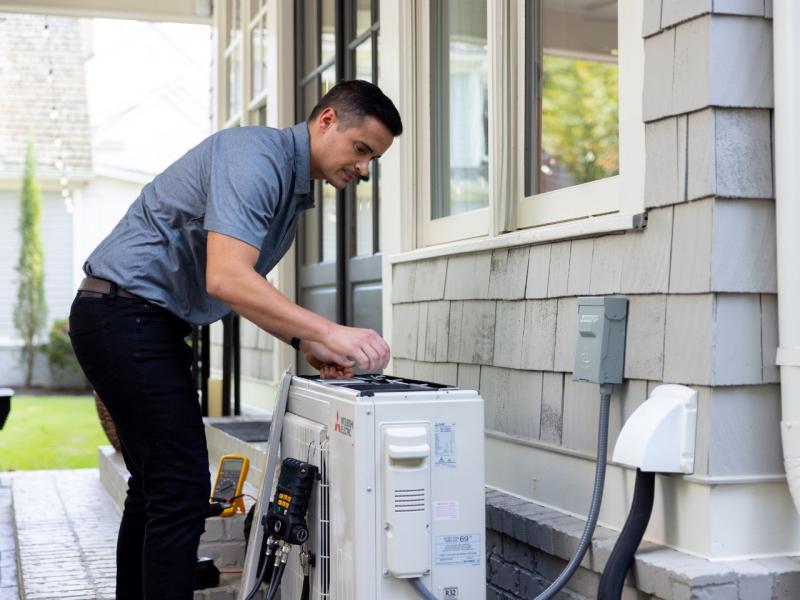Complete Guide to Installing Your Ideal Home Air Conditioning System

Installing an air conditioning system in your home is a significant investment that can greatly enhance your comfort, especially during the hot summer months. This comprehensive guide will walk you through everything you need to know about choosing and installing the perfect air conditioning system for your home while highlighting the crucial role of professional services.
Understanding Your Cooling Needs
Before you start shopping for an HVAC systems or air conditioning system, it’s important to understand your specific cooling needs. Factors such as the size of your home, the local climate, and your budget will influence your decision. Here’s how to get started:
- Evaluate Your Home’s Size and Layout: The size and layout of your home are critical factors in determining the type and size of the air conditioning system you need. A system that is too small will struggle to cool your home, while an oversized system can lead to inefficiencies and higher energy bills. Measure the square footage of your home and consider the number of rooms and their arrangement.
- Consider Local Climate: Your local climate will also influence your choice. For example, if you live in a region with hot, humid summers, you’ll need a system capable of handling both high temperatures and humidity. Conversely, in milder climates, a less powerful system might suffice.
- Set Your Budget: Air conditioning systems come in a range of prices, so it’s important to set a budget before you start shopping. Remember to factor in not just the initial cost of the unit, but also the installation, maintenance, and operating costs. HVAC Repair Newport Beach
Types of Air Conditioning Systems
There are several types of air conditioning systems to choose from, each with its advantages and disadvantages. Here are the most common types:
- Central Air Conditioning: Central air conditioning is one of the most popular options for cooling entire homes. It uses a network of ducts to distribute cool air throughout your home. Central air systems are efficient and provide even cooling, but they can be expensive to install, especially if your home doesn’t already have ductwork.
- Ductless Mini-Split Systems: Ductless mini-split systems are a flexible and efficient option for cooling individual rooms or zones within your home. They consist of an outdoor unit connected to one or more indoor units, and they don’t require ductwork. This makes them a good option for homes without existing ducts or for adding cooling to specific areas.
- Window Units: Window air conditioning units are a cost-effective solution for cooling single rooms. They are easy to install and remove, making them a good choice for renters or temporary cooling needs. However, they can be less efficient than other types of systems and may not be sufficient for cooling larger spaces.
- Portable Air Conditioners: Portable air conditioners are similar to window units but can be moved from room to room. They are easy to install and offer flexibility, but they can be noisy and less efficient than other options.
- Heat Pumps: Heat pumps are a versatile option that can provide both heating and cooling. They work by transferring heat between your home and the outside air. Heat pumps are energy-efficient and can be a good choice in moderate climates, but they may struggle in extreme temperatures.
Choosing The Right System For Your Home
Once you understand your cooling needs and the different types of air conditioning systems available, you can start narrowing down your options. Here are some key factors to consider:
- Energy Efficiency: Energy efficiency is an important consideration when choosing an air conditioning system. Look for units with high SEER (Seasonal Energy Efficiency Ratio) ratings, which indicate better energy efficiency. While more efficient units may have a higher upfront cost, they can save you money on energy bills over time.
- Cooling Capacity: Cooling capacity, measured in BTUs (British Thermal Units), is another important factor. Make sure the system you choose has the right capacity for your home. A professional can help you calculate the appropriate size based on factors such as your home’s square footage, insulation, and number of windows.
- Noise Levels: Some air conditioning systems can be quite noisy, which can be a concern, especially for bedrooms and living areas. Check the noise levels of different units and choose one that operates quietly.
- Additional Features: Modern air conditioning systems come with a range of additional features, such as programmable thermostats, remote controls, and air purifiers. Consider which features are important to you and look for systems that offer them.
The Importance of Professional Installation
While it might be tempting to save money by installing your air conditioning system yourself, it’s important to understand the value of professional installation. Here’s why hiring a professional is crucial:
- Expertise and Experience: Professional HVAC technicians have the expertise and experience to ensure your system is installed correctly. They can properly size and place your unit, install necessary ductwork, and ensure all components are connected and functioning properly. This can help prevent issues down the line and extend the lifespan of your system.
- Safety: Installing an air conditioning system involves working with electrical components and refrigerants, which can be dangerous if not handled correctly. Professional technicians are trained to handle these materials safely and can help prevent accidents and injuries.
- Efficiency: A properly installed air conditioning system will operate more efficiently, saving you money on energy bills. Professionals can also help you optimize your system’s performance through proper calibration and testing.
- Warranty Protection: Many air conditioning systems come with warranties that require professional installation. If you attempt to install the system yourself and something goes wrong, you could void the warranty and be responsible for the repair costs. Hiring a professional ensures your warranty remains intact.
Preparing for Installation
Once you’ve chosen your air conditioning system and hired a professional for the installation, there are a few steps you can take to prepare:
- Clear the Installation Area: Make sure the area where the unit will be installed is clear of furniture, plants, and other obstructions. This will make it easier for the technicians to access the installation site and complete the job efficiently.
- Plan for the Installation Day: On the day of the installation, make arrangements to be at home and ensure there is easy access to your home for the technicians. If you have pets, consider keeping them in a separate room to avoid any disruptions.
- Communicate with Your Installer: Discuss any specific concerns or preferences with your installer before the installation begins. This can help ensure the process goes smoothly and that you’re satisfied with the final result.
Post-Installation Tips
After your new air conditioning system is installed, there are a few steps you can take to keep it running smoothly:
- Regular Maintenance: Regular maintenance is key to keeping your system operating efficiently. Schedule annual inspections and tune-ups with a professional HVAC technician to ensure your system is in good working order. This can help prevent costly repairs and extend the lifespan of your unit.
- Change Filters Regularly: Changing the air filters regularly is one of the simplest and most effective ways to maintain your system’s efficiency. Clogged filters can restrict airflow and reduce cooling performance, so be sure to replace them according to the manufacturer’s recommendations.
- Monitor System Performance: Keep an eye on your system’s performance and be alert to any signs of problems, such as unusual noises, uneven cooling, or increased energy bills. If you notice any issues, contact a professional HVAC technician for an inspection and repairs.
Installing the ideal air conditioning system for your home can greatly enhance your comfort and quality of life. By understanding your cooling needs, choosing the right system, and emphasizing the importance of professional installation and maintenance, you can enjoy efficient and reliable cooling for years to come. Remember, investing in professional services not only ensures the safety and efficiency of your system but also protects your investment and provides peace of mind.


Comments